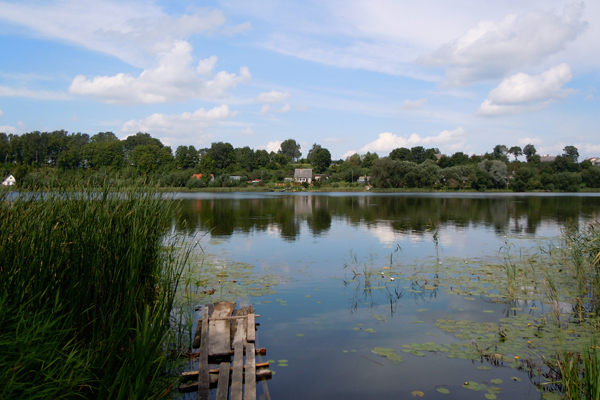
From Rezekne, I need half-hour by bus to travel 30 km. I go to the oldest in Latvia and I quickly understand the meaning of "oldest". The road is bumpy, I jumped on the seat of the bus at each pothole. The birds and cows are part of the landscape. When I arrive in the center, only the main road is paved, the rest are dusty roads or partially covered with asphalt. Anyway, I'm not here to admire the roads but the scenery.
Again, the sun is with me along my walk along the small Ludza lake. I discover a memorial to Jews murdered during the Second World War. At the edge of the calm water, it is hard to imagine a massacre. In the 18th century, Ludza was called the "Jerusalem of Latvia" and 58% of the population was Jewish. There are still traces of the wooden synagogue built in 1800 or the Jewish cemetery.
Ludza was also an important commercial crossroads for centuries by its strategic position on the border with Russia. Many merchants were transiting through the village and the activity was intense. Today it is rather a quiet and peaceful town looking for a new dynamism.
Wooden houses follow one another, passers-by are rare but their expressive faces speak about the hard work of their day. After the center, I climbed the small hill overlooking the Big Ludza lake. At the top, majestic in its white dress, stands the Catholic church. The city is a real mix of European religions, Jews, Catholics, old believers, Protestants and Orthodox Christians live together. The Catholic church, built in 1687 by the Poles, is the most impressive. In a garden, with two towers decorated with golden crosses and five altars, it is representative of Ludza rich past.
At its side, I discover the ruins of the Livonian castle built in 1399 by the Germans this time. There is no much left apart from a green lawn and red bricks. The view is ghostly, between the arches in ruins, I see discreetly the water of the two lower lakes. I sit quietly in the shadows and began to write. The inspiration comes from the peacefull place. Alone, I sit for several hours: I have found my new office!
I'm going down quietly to the small center, then to the bus station. Ludza is a charming town steeped in history and lives with its time. Since 2004, its became the crossroads between the European Union and Russia. Two worlds merge and separate, the influences are increasing and the interaction of traditions, cultures and architectures give its identity to Ludza.
Photos album








